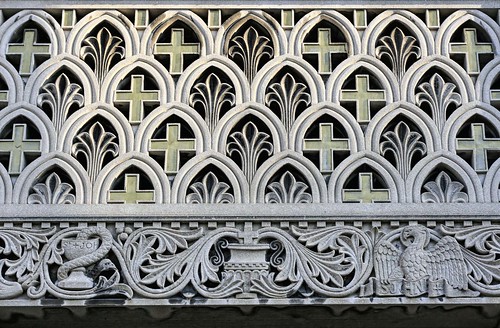A trio of reads to share with you this Eclipse Monday. (Can’t you tell how cheery they are from the post title?)
First, a review of the new book Rethinking Modernism and the Built Environment, a collection of essays edited by Almantas Samalavicius. As you likely know, I’m not a fan of modern architecture, and in fact would consider myself an enemy of its inhumanity.
As Samalavicius sees it, the challenges cities face are not only “unprecedented levels of urbanity,” but the homogenizing effects of “economic globalism” and how they have reduced or erased local and cultural diversity. Moreover, this is not a new, 21st-century phenomenon.The large-scale reconstruction of Europe after World War II, he says, “demanded cheap and functional buildings, and that was what architectural Modernism seemed to be able to offer.”
…as summed up by Nikos Salingaros, author of Principles of Urban Structure, is that “By removing urban complexity, the simplistic Modernist model has destroyed our cities.”
A brief review, but worth reading. If you’d like another (less pricey) read along the same lines, Thomas Wolfe’s From Bauhaus To Our Haus is quite worthwhile indeed.
Architecture influences those living around and within it, and our own hearts, of course, influence architecture (as it is out of human hearts that building designs spring). So I can’t help but see this excellent Daniel Greenfield piece, Virtue and the Moral Fall of Civilization, as related to the modern state—and small, if increasing rebellion against—of architecture.
A civilization is not a mechanical endeavor, but a moral one. The virtues that uphold a civilization, the ability to reason, to work hard, to study how to solve a problem, to sacrifice now for future gain, to cooperate with those outside the tribe, to value truth, beauty and goodness for their own sake are individual, but they are also social. A society that cultivates these virtues in people can prosper. As society loses these virtues, it grows dysfunctional. It loses winnable wars, it squanders vast wealth, it loses its work ethics, its ability to cooperate and to plan for the long term. It slowly dies.
Barbarians are not savages because they wear loincloths or bones through their noses, or even because they lack the majority of these virtues, but because they lack the ability to appreciate them. A barbarian who appreciates civilizational virtues can become civilized, but a civilized barbarian may wear a suit and tie, but is still a savage because he cannot even appreciate the virtues of his ancestors.
As a civilization declines, it becomes barbaric.
It’s quite a read, and what I would in fact call a must-read.
Finally, and of course related to ideas in the other two reads, is this Deusie from the Remodern Review in response to an article about conceptual art and the public’s…well, lack of response to it. Or lack of acceptable response (you bumpkins!) to what Mr. Bledsoe aptly refers to as “the inadequate offerings of our corrupted cultural institutions”. It’s brief and enjoyable. Pop over as your Monday treat. (Hey, some folks gorge on ice cream, yours truly indulges in cultural commentary. It takes all kinds.)



Wow, thanks for sharing!
You are welcome–I very much enjoy your work!